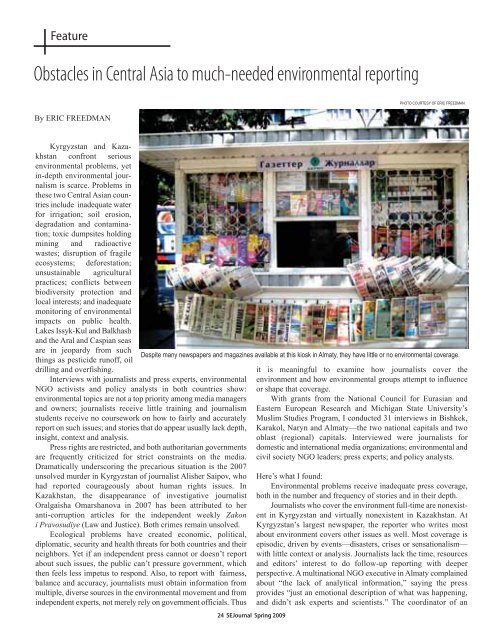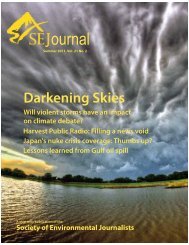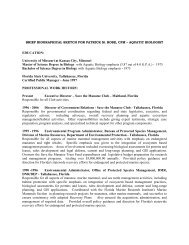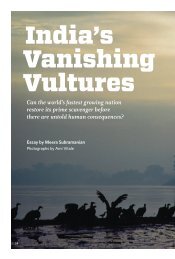FeatureObstacles in Central Asia to much-needed environmental reportingBy ERIC FREEDMANPHOTO COURTESY OF ERIC FREEDMANKyrgyzstan and Kazakhstanconfront seriousenvironmental problems, yetin-depth environmental journalismis scarce. Problems inthese two Central Asian countriesinclude inadequate waterfor irrigation; soil erosion,degradation and contamination;toxic dumpsites holdingmining and radioactivewastes; disruption <strong>of</strong> fragileecosystems; deforestation;unsustainable agriculturalpractices; conflicts betweenbiodiversity protection andlocal interests; and inadequatemonitoring <strong>of</strong> environmentalimpacts on public health.Lakes Issyk-Kul and Balkhashand the Aral and Caspian seasare in jeopardy from suchthings as pesticide run<strong>of</strong>f, oildrilling and overfishing.Interviews with journalists and press experts, environmentalNGO activists and policy analysts in both countries show:environmental topics are not a top priority among media managersand owners; journalists receive little training and journalismstudents receive no coursework on how to fairly and accuratelyreport on such issues; and stories that do appear usually lack depth,insight, context and analysis.Press rights are restricted, and both authoritarian governmentsare frequently criticized for strict constraints on the media.Dramatically underscoring the precarious situation is the 2007unsolved murder in Kyrgyzstan <strong>of</strong> journalist Alisher Saipov, whohad reported courageously about human rights issues. InKazakhstan, the disappearance <strong>of</strong> investigative journalistOralgaisha Omarshanova in 2007 has been attributed to heranti-corruption articles for the independent weekly Zakoni Pravosudiye (Law and Justice). Both crimes remain unsolved.Ecological problems have created economic, political,diplomatic, security and health threats for both countries and theirneighbors. Yet if an independent press cannot or doesn’t reportabout such issues, the public can’t pressure government, whichthen feels less impetus to respond. Also, to report with fairness,balance and accuracy, journalists must obtain information frommultiple, diverse sources in the environmental movement and fromindependent experts, not merely rely on government <strong>of</strong>ficials. ThusDespite many newspapers and magazines available at this kiosk in Almaty, they have little or no environmental coverage.24 SEJournal Spring 2009it is meaningful to examine how journalists cover theenvironment and how environmental groups attempt to influenceor shape that coverage.With grants from the National Council for Eurasian andEastern European Research and Michigan State University’sMuslim Studies Program, I conducted 31 interviews in Bishkek,Karakol, Naryn and Almaty—the two national capitals and twooblast (regional) capitals. Interviewed were journalists fordomestic and international media organizations; environmental andcivil society NGO leaders; press experts; and policy analysts.Here’s what I found:<strong>Environmental</strong> problems receive inadequate press coverage,both in the number and frequency <strong>of</strong> stories and in their depth.<strong>Journalists</strong> who cover the environment full-time are nonexistentin Kyrgyzstan and virtually nonexistent in Kazakhstan. AtKyrgyzstan’s largest newspaper, the reporter who writes mostabout environment covers other issues as well. Most coverage isepisodic, driven by events—disasters, crises or sensationalism—with little context or analysis. <strong>Journalists</strong> lack the time, resourcesand editors’ interest to do follow-up reporting with deeperperspective. A multinational NGO executive in Almaty complainedabout “the lack <strong>of</strong> analytical information,” saying the pressprovides “just an emotional description <strong>of</strong> what was happening,and didn’t ask experts and scientists.” The coordinator <strong>of</strong> an
environmental Web site funded by international donors says, “Theweakness is that there is no strict, direct, environmental journalismbecause journalists are writing from event to event orsensation or scandal.”There are several principal reasons:• Difficult access to information and comments from public<strong>of</strong>ficials and bureaucrats. Interviewees cite deliberate obstruction,coupled with a reluctance or refusal to be quoted, as well as denial<strong>of</strong> requests for reports and formal statements. A Bishkek journalistacknowledges “Getting access is difficult. That’s normal allacross the region anytime you talk about a sensitive issue, giventhe track record <strong>of</strong> government <strong>of</strong>ficials.” <strong>Environmental</strong> NGOactivists cite similar problems: One in Kazakhstan notes: “Accessto information from government? This is not a tragedy. This is alaw <strong>of</strong> life. We are very far from the democracy people aretalking about.”• Difficulty in obtaining information and analysis fromindependent experts, due in part to their scarcity — many havingemigrated — and reluctance <strong>of</strong> many who remain to antagonizepowerful interests. A TV journalist interested in air pollution says,“There are no alternative specialists who can do research and havespecial equipment to measure poison in the air andcompare it with statistics from the state. Because there are no suchexperts, we have to rely on the state.”• Few truly independent domestic media exist. Those thataren’t state-owned generally are owned or controlled by friends,relatives and allies <strong>of</strong> the regimes, by opposition parties, byindividual politicians or by well-heeled business owners, anddon’t report impartially on environmental issues. An internationalNGO executive says, “Their understanding <strong>of</strong> `independence’ is`write whatever the customer demands.’”• Most media owners put low priority on environmentalcoverage, allocating little space or airtime except for crises. Careeradvancement comes with covering economics, internationalrelations and politics, not environment. A media consultant inKyrgyzstan says, “Even if there is an ecological accident thatwould interest local media, there would not be strong in-depthanalysis in the story for a simple reason: that’s not demanded byeditorial <strong>of</strong>fices.”• News organizations lack financial and staff resources forcomprehensive coverage. The Kyrgyzstan country director <strong>of</strong>Internews noted that regional TV stations with limited budgetsand “trying to make a living” can’t afford to travel outside theirlocales. And a TV editor in Bishkek says his station can’t affordto rent a helicopter to cover the impact <strong>of</strong> global warming onmountainous Kyrgyzstan’s glaciers.• Universities don’t teach environmental journalism. Whilethere are some NGO-sponsored trainings, most pr<strong>of</strong>essionals lacksubstantive knowledge and practical skills to competently tacklesuch complex issues as nuclear waste disposal, desertification andclimate change. A Talas journalist says journalists have difficultyunderstanding environmental problems and terminology: “Theycan’t do analytical work, just reporting, because <strong>of</strong> a lack <strong>of</strong>pr<strong>of</strong>essional skills.”• A perception—true or not—is that the public is disinterestedin environmental issues, except problems in their immediate area.An independent radio journalist observes that while “a smallgroup” <strong>of</strong> activists might press government to act on a problem,PHOTO COURTESY OF ERIC FREEDMANThe well-being <strong>of</strong> Lake Issyk-Kul, Kyrgyzstan, located just beyond this cemetery,faces threats from dropping water levels, overfishing, development and agriculturaland mining-related contamination.“most <strong>of</strong> the population doesn’t know the current situation onenvironmental issues and don’t want to know.”• Overall, weak relationships and a lack <strong>of</strong> trust exist betweenNGOs and journalists, although relations may be stronger at thelocal than national level. As the head <strong>of</strong> one news service said,many NGOs in repressive societies aren’t eager to publicize theiractions and lack the capacity to work with the press. Reasonsinclude: fear <strong>of</strong> antagonizing authorities and irritating donors;limited finances; failure to collaborate with each other; and lack<strong>of</strong> public relations training.• The practice <strong>of</strong> “envelope journalism”— bribery—detersactivist organizations from seeking coverage and impedes theirability to compete for media attention with well-heeled businessinterests. A journalist in Kyrgyzstan says the problem hasworsened because <strong>of</strong> hard economic times: “It’s increasinglydifficult to talk about standards and ethics if there’s no way <strong>of</strong>implementing that.”Implications:Weak environmental reporting can’t be regarded in isolationbecause that failure carries wider ramifications. For example,environmental problems link closely to the economy anddevelopment, health, regional security, energy and mineralproduction, politics and international relations. And factors thatimpede environmental reporting reflect broader challenges fordemocratization, civil society and public participation inpolicymaking.In addition, failure to report accurately and insightfullyimpedes building <strong>of</strong> public trust in the press and reinforces longstandingbeliefs that the press is a biased tool <strong>of</strong> the regime, theregime’s rivals or other influential interests. At the same time,aggressive reporting can have a positive impact. For example, aNaryn journalist described how his coverage <strong>of</strong> a Chinese-ownedmining company’s illegal cutting <strong>of</strong> trees led the Kyrgyz governmentto deny it an operating license, and his articles aboutoverfishing in Lake Son-Kol led to a two-year fishing ban.Pulitzer Prize-winner Eric Freedman is an associate pr<strong>of</strong>essor <strong>of</strong>journalism and assistant dean <strong>of</strong> international studies & programsat Michigan State University, where he is associated with theKnight Center for <strong>Environmental</strong> Journalism.25 SEJournal Spring 2009












